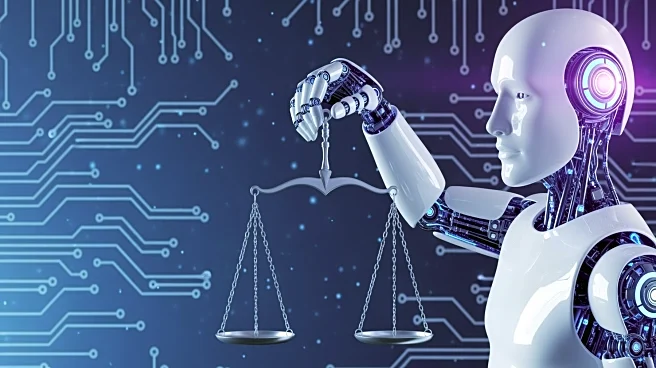What's Happening?
The legal community is being encouraged to shift its focus from the risks to the benefits of artificial intelligence (AI) in legal practice. Comment 8 to Model Rule 1.1 highlights the ethical duty of lawyers
to understand and leverage the benefits of technology, including AI. Despite the prevalent discussions at legal tech conferences about the risks associated with AI, such as hallucinations and confidentiality breaches, experts argue that the benefits, such as increased efficiency and improved client service, should not be overlooked. The emphasis is on using AI to enhance legal practice by providing better insights, predicting case outcomes, and improving courtroom technology use.
Why It's Important?
The integration of AI into legal practice has the potential to significantly transform the industry by making legal services more efficient and cost-effective. Lawyers who embrace AI can offer more timely advice to clients, potentially reducing legal fees and improving client satisfaction. The focus on benefits rather than risks could lead to a more widespread adoption of AI tools, enhancing the overall competency of legal professionals. This shift is crucial as it aligns with the ethical duty to benefit clients, ensuring that legal services are not only accurate but also delivered in a manner that serves the best interests of clients.
What's Next?
Legal professionals are encouraged to start using AI tools for personal and inconsequential tasks to build familiarity and competence. This hands-on approach is expected to demystify AI and reduce apprehension about its complexity. As lawyers become more comfortable with AI, they can integrate it into more complex legal tasks, potentially revolutionizing the practice of law. The ongoing dialogue about AI's role in legal practice is likely to continue, with more emphasis on training and education to ensure lawyers can effectively leverage AI's capabilities.
Beyond the Headlines
The ethical implications of AI in law extend beyond efficiency and client service. There is a need for ongoing education and adaptation to ensure that legal professionals can navigate the evolving landscape of technology. The conversation around AI also touches on broader issues of privacy and data security, requiring careful consideration of how client information is handled. As AI becomes more integrated into legal practice, it may also influence the development of new legal standards and practices, shaping the future of the legal profession.








